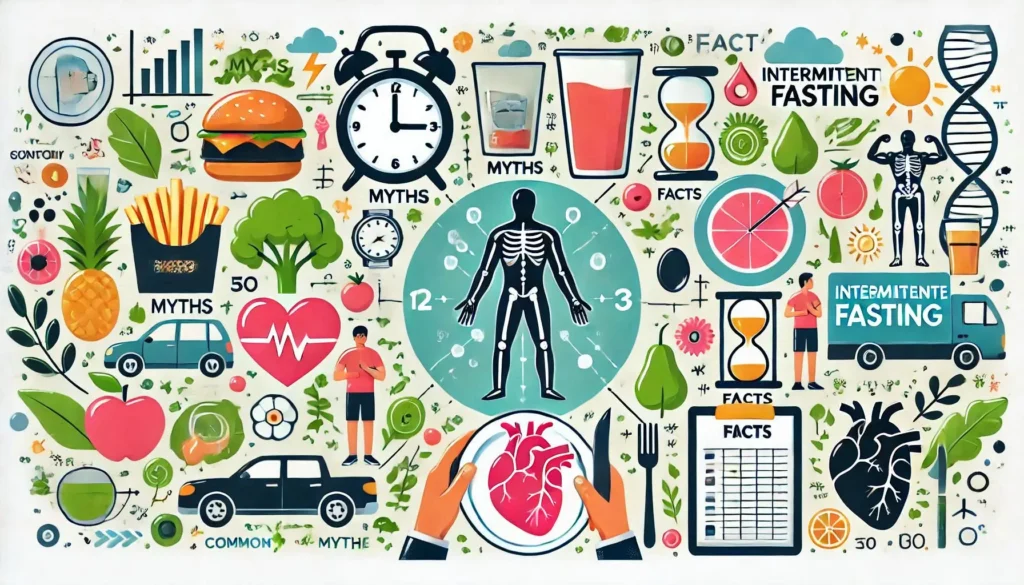Intermittent Fasting Benefits and Guidelines
A Comprehensive Guide to Maximizing Your Health and Wellness

Section 1: Introduction and Overview
Intermittent Fasting Benefits and Guidelines for Beginners: A Comprehensive Guide
Are you interested in trying intermittent fasting, but don’t know where to start? Intermittent fasting is a popular diet trend that involves cycling between periods of eating and fasting. This approach has been shown to have numerous health benefits, including weight loss, improved insulin sensitivity, and increased longevity.
In this article, we will provide a comprehensive guide for beginners, including the benefits and types of intermittent fasting, as well as tips for incorporating it into your lifestyle. Whether you’re looking to improve your overall health or simply want to try a new diet approach, this guide will provide you with the information you need to get started.
What is Intermittent Fasting?
Intermittent fasting is a dietary approach that involves cycling between periods of eating and fasting. This can be done in a variety of ways, including alternating between days of normal eating and days of calorie restriction or restricting your eating to certain hours of the day.

Benefits and Types of Intermittent Fasting
Benefits of Intermittent Fasting
Intermittent fasting is more than just a diet; it offers a range of health benefits that can enhance your overall well-being. Here are some key advantages:
1. Weight Loss
Intermittent fasting can help you lose weight by reducing your calorie intake. By limiting your eating window, you naturally consume fewer calories, which can lead to weight loss.
2. Improved Insulin Sensitivity
This dietary approach can enhance your body’s insulin sensitivity, helping to regulate blood sugar levels. Improved insulin sensitivity lowers the risk of type 2 diabetes.
3. Increased Human Growth Hormone (HGH)
Fasting can significantly boost the production of human growth hormone, which aids in fat loss and muscle gain.
4. Enhanced Autophagy
During fasting, your body undergoes autophagy, a process that cleans out damaged cells and regenerates new ones. This cellular renewal promotes better health and longevity.
5. Better Mental Clarity
Many people experience improved focus and mental clarity during fasting periods. This may be due to increased levels of brain-derived neurotrophic factor (BDNF), which supports brain health.
6. Reduced Inflammation
Intermittent fasting has been shown to lower markers of inflammation and oxidative stress, which are linked to chronic diseases.
7. Potential Longevity Benefits
Some studies suggest that intermittent fasting may extend lifespan by promoting cellular repair processes and reducing the risk of age-related diseases.

Types of Intermittent Fasting
There are several popular methods of intermittent fasting, each with its own unique approach. Here are some common types:
1. (16:8 Method)
Fast for 16 hours and eat during an 8-hour window. For example, eat between noon and 8 PM, skipping breakfast.
2. (5:2 Diet)
Eat normally for five days and restrict calorie intake to 500-600 calories on two non-consecutive days.
3. Alternate Day Fasting
Alternate between days of normal eating and days of calorie restriction, allowing flexibility in your eating schedule.
4. Eat-Stop-Eat
Fast for a full 24 hours once or twice a week. For instance, fast from dinner one day until dinner the next day.
5. Warrior Diet
Eat small amounts of raw fruits and vegetables during the day and consume a large meal at night.

Getting Started with Intermittent Fasting
If you’re interested in trying intermittent fasting, it’s essential to approach it thoughtfully. Here’s a step-by-step guide to help you get started:
1. Choose Your Fasting Method
The first step is to select a fasting method that fits your lifestyle. Consider your daily schedule, eating habits, and personal preferences. Here are a few popular methods to consider:
- 16:8 Method: Fast for 16 hours and eat during an 8-hour window.
- 5:2 Diet: Eat normally for five days and restrict calories on two non-consecutive days.
- Alternate Day Fasting: Alternate between days of normal eating and fasting.
- Eat-Stop-Eat: Fast for 24 hours once or twice a week.
- Warrior Diet: Eat small amounts during the day and have one large meal at night.
2. Start Gradually
If you’re new to fasting, it can be helpful to ease into it. Start with shorter fasting periods, such as 12 hours, and gradually increase the duration as your body adjusts. This approach can make the transition smoother and more manageable.
3. Stay Hydrated
During fasting periods, it’s crucial to stay hydrated. Drink plenty of water, herbal teas, or black coffee to help curb hunger and keep your energy levels up. Avoid sugary drinks and high-calorie beverages, as they can break your fast.
4. Focus on Nutrient-Dense Foods
When you do eat, prioritize whole, nutrient-dense foods. Incorporate plenty of fruits, vegetables, lean proteins, healthy fats, and whole grains into your meals. This will help you feel satisfied and provide your body with the essential nutrients it needs.
5. Listen to Your Body
Pay attention to how your body responds to intermittent fasting. If you feel excessively hungry, fatigued, or unwell, it may be a sign that fasting isn’t right for you or that you need to adjust your approach. It’s essential to find a balance that works for your individual needs.
6. Be Consistent
Consistency is key to reaping the benefits of intermittent fasting. Try to stick to your chosen fasting schedule as closely as possible. However, it’s also important to be flexible and allow for occasional deviations, especially during social events or holidays.
7. Consult a Healthcare Professional
Before starting any new dietary regimen, especially if you have underlying health conditions or concerns, it’s a good idea to consult with a healthcare professional. They can provide personalized advice and ensure that intermittent fasting is safe for you.

Common Challenges of Intermittent Fasting
While intermittent fasting can offer numerous benefits, it’s not without its challenges. Here are some common obstacles you may encounter and tips on how to overcome them:
1. Hunger Pangs
Challenge: One of the most immediate challenges of intermittent fasting is dealing with hunger, especially in the beginning.
Solution: To manage hunger, stay hydrated by drinking plenty of water, herbal teas, or black coffee. These can help fill your stomach and reduce feelings of hunger. Additionally, focusing on high-fiber and protein-rich foods during your eating window can help you feel fuller for longer.
2. Low Energy Levels
Challenge: Some people may experience fatigue or low energy, particularly when they first start fasting.
Solution: Ensure you’re consuming enough calories and nutrients during your eating periods. Incorporate complex carbohydrates, healthy fats, and proteins to provide sustained energy. If you find that your energy levels are consistently low, consider adjusting your fasting schedule or consulting a healthcare professional.
3. Social Situations
Challenge: Social events often revolve around food, which can make it challenging to stick to your fasting plan.
Solution: Plan ahead by choosing a fasting method that allows for flexibility. If you know you have a social event, you can adjust your fasting window accordingly. Communicate with friends or family about your dietary choices, and don’t hesitate to bring your own healthy snacks if needed.
4. Overeating During Eating Windows
Challenge: Some individuals may find themselves overeating during their eating windows, negating the benefits of fasting.
Solution: Practice mindful eating by paying attention to your hunger cues and eating slowly. Focus on portion control and prioritize nutrient-dense foods. It can also be helpful to plan your meals in advance to avoid impulsive eating.
5. Difficulty Sleeping
Challenge: Some people may experience sleep disturbances when they start intermittent fasting.
Solution: If you find that fasting affects your sleep, try adjusting your eating window to ensure you’re not going to bed hungry. Avoid heavy meals close to bedtime, and create a relaxing bedtime routine to promote better sleep.
6. Emotional Eating
Challenge: Fasting can sometimes trigger emotional eating or cravings, especially if you associate food with comfort.
Solution: Identify your triggers and find alternative coping mechanisms, such as engaging in a hobby, exercising, or practicing mindfulness techniques. Keeping a journal to track your feelings and eating habits can also help you recognize patterns and make healthier choices.

Tips for Success with Intermittent Fasting
To maximize the benefits of intermittent fasting and make it a sustainable part of your lifestyle, consider the following tips:
1. Stay Consistent
Tip: Consistency is crucial for success with intermittent fasting. Try to stick to your chosen fasting schedule as closely as possible. This helps your body adapt to the new routine and can enhance the benefits over time.
2. Plan Your Meals
Tip: Meal planning can make a significant difference in your success. Prepare healthy meals and snacks in advance to ensure you have nutritious options available during your eating windows. This can help you avoid unhealthy choices and keep you on track.
3. Keep a Fasting Journal
Tip: Consider keeping a journal to track your fasting schedule, meals, and how you feel throughout the process. This can help you identify patterns, celebrate your successes, and make adjustments as needed.
4. Find a Support System
Tip: Having a support system can make a big difference in your fasting journey. Share your goals with friends or family members who can encourage you and hold you accountable. You might also consider joining online communities or forums focused on intermittent fasting.
5. Be Patient
Tip: Remember that results may take time. It’s essential to be patient and give your body time to adjust to the new eating pattern. Focus on the long-term benefits rather than immediate results.
6. Stay Flexible
Tip: Life can be unpredictable, and it’s important to remain flexible with your fasting schedule. If you miss a fasting period or have a day where you eat more than planned, don’t be too hard on yourself. Just get back on track the next day.
7. Focus on Whole Foods
Tip: Prioritize whole, unprocessed foods during your eating windows. Foods rich in nutrients, such as fruits, vegetables, whole grains, lean proteins, and healthy fats, will help you feel satisfied and energized.
8. Monitor Your Progress
Tip: Keep track of your progress, whether it’s weight loss, improved energy levels, or other health markers. Monitoring your progress can help you stay motivated and make necessary adjustments to your approach.
9. Educate Yourself
Tip: Stay informed about intermittent fasting and its benefits. Reading books, articles, or watching videos can provide you with valuable insights and keep you motivated.
10. Consult a Professional
Tip: If you have any health concerns or specific dietary needs, consider consulting a healthcare professional or a registered dietitian. They can provide personalized guidance and ensure that intermittent fasting is safe and effective for you.

Potential Health Benefits of Intermittent Fasting
Intermittent fasting has gained popularity not only for weight management but also for its potential health benefits. Here are some of the key advantages associated with this eating pattern:
1. Weight Loss and Fat Loss
Benefit: One of the most well-known benefits of intermittent fasting is its effectiveness in promoting weight loss. By reducing the eating window, many people naturally consume fewer calories, leading to weight loss. Additionally, fasting can enhance fat burning by increasing levels of norepinephrine, a hormone that helps break down fat.
2. Improved Insulin Sensitivity
Benefit: Intermittent fasting may improve insulin sensitivity, which can help lower blood sugar levels. This is particularly beneficial for individuals at risk of type 2 diabetes. Improved insulin sensitivity allows the body to use glucose more effectively, reducing the risk of insulin resistance.
3. Enhanced Brain Health
Benefit: Research suggests that intermittent fasting may have neuroprotective effects, promoting brain health and potentially reducing the risk of neurodegenerative diseases. Fasting can stimulate the production of brain-derived neurotrophic factor (BDNF), a protein that supports the growth and survival of neurons.
4. Reduced Inflammation
Benefit: Intermittent fasting may help reduce inflammation in the body. Chronic inflammation is linked to various health issues, including heart disease, diabetes, and certain cancers. By promoting cellular repair processes and reducing oxidative stress, fasting can contribute to lower inflammation levels.
5. Heart Health
Benefit: Intermittent fasting may improve several risk factors for heart disease, including blood pressure, cholesterol levels, triglycerides, and inflammatory markers. These improvements can contribute to better overall cardiovascular health.
6. Longevity
Benefit: Some animal studies suggest that intermittent fasting may extend lifespan by promoting cellular repair processes and reducing the risk of age-related diseases. While more research is needed in humans, the potential for increased longevity is an exciting area of study.
7. Improved Metabolic Health
Benefit: Intermittent fasting can enhance metabolic health by improving various metabolic markers, including blood sugar levels, insulin sensitivity, and lipid profiles. This can lead to a lower risk of metabolic syndrome and related conditions.
8. Enhanced Autophagy
Benefit: Fasting triggers a process called autophagy, where the body cleans out damaged cells and regenerates new ones. This cellular repair mechanism is believed to play a role in preventing diseases and promoting overall health.
9. Better Digestive Health
Benefit: Giving your digestive system a break during fasting periods can improve gut health. Intermittent fasting may help regulate gut bacteria and promote a healthier digestive system.
10. Mental Clarity and Focus
Benefit: Many people report improved mental clarity and focus during fasting periods. This may be due to increased production of ketones, which serve as an alternative energy source for the brain.

Intermittent Fasting and Exercise
Combining intermittent fasting with an exercise routine can enhance the benefits of both practices. However, it’s essential to understand how fasting may affect your workouts and how to optimize your performance while fasting. Here are some key points to consider:
1. Timing Your Workouts
Tip: The timing of your workouts in relation to your eating windows can significantly impact your performance and recovery. Many people find it beneficial to exercise during their fasting period, especially if they are accustomed to working out in a fasted state. However, if you’re doing high-intensity workouts or strength training, you may prefer to schedule your workouts closer to your eating window to ensure you have energy and nutrients available for recovery.
2. Types of Exercise
Tip: Different types of exercise may respond differently to fasting. Low to moderate-intensity activities, such as walking, yoga, or light cycling, can often be performed effectively while fasting. High-intensity workouts or heavy lifting may require more energy, so consider adjusting your fasting schedule or having a small pre-workout snack if needed.
3. Hydration is Key
Tip: Staying hydrated is crucial, especially during fasting periods. Dehydration can lead to decreased performance and increased fatigue. Make sure to drink plenty of water before, during, and after your workouts, regardless of whether you are fasting.
4. Listen to Your Body
Tip: Pay attention to how your body responds to fasting and exercise. If you feel fatigued, dizzy, or unwell during workouts, it may be a sign that you need to adjust your fasting schedule or modify your exercise intensity. Everyone’s body is different, so it’s essential to find what works best for you.
5. Focus on Recovery
Tip: Recovery is vital when combining intermittent fasting and exercise. Ensure you are consuming adequate nutrients during your eating windows to support muscle recovery and replenish glycogen stores. Incorporate protein-rich foods to aid muscle repair and growth.
6. Consider Your Goals
Tip: Your fitness goals can influence how you approach intermittent fasting and exercise. If your primary goal is weight loss, fasting may complement your routine well. However, if you’re focused on building muscle or improving athletic performance, you may need to adjust your fasting approach to ensure you’re fueling your body adequately.
7. Experiment and Adjust
Tip: Everyone’s experience with intermittent fasting and exercise is unique. Experiment with different fasting schedules, workout times, and intensities to find what works best for you. Keep track of your energy levels, performance, and recovery to make informed adjustments.
8. Consult a Professional
Tip: If you have specific fitness goals or health concerns, consider consulting a fitness professional or a registered dietitian. They can provide personalized guidance on how to effectively combine intermittent fasting with your exercise routine.

Common Myths and Misconceptions about Intermittent Fasting
As intermittent fasting has gained popularity, several myths and misconceptions have emerged. Understanding the facts can help you make informed decisions about whether this eating pattern is right for you. Here are some common myths debunked:
1. Myth: Intermittent Fasting is Just Another Diet
Fact: Intermittent fasting is not a diet in the traditional sense; it’s an eating pattern. It focuses on when you eat rather than what you eat. While it can lead to weight loss, it’s more about timing than calorie restriction.
2. Myth: You Can Eat Whatever You Want During Eating Windows
Fact: While intermittent fasting allows for flexibility in food choices, it’s essential to prioritize nutritious foods during eating windows. Consuming a diet high in processed foods and sugars can negate the health benefits of fasting.
3. Myth: Fasting Slows Down Your Metabolism
Fact: Short-term fasting does not slow down metabolism. In fact, it can enhance metabolic rate due to increased norepinephrine levels. However, prolonged fasting without adequate nutrition can lead to muscle loss and a decrease in metabolic rate.
4. Myth: Intermittent Fasting is Unsafe for Everyone
Fact: While intermittent fasting is safe for many people, it may not be suitable for everyone. Individuals with certain health conditions, pregnant or breastfeeding women, and those with a history of eating disorders should consult a healthcare professional before starting.
5. Myth: You Must Fast for 24 Hours or More to See Benefits
Fact: You don’t need to fast for extended periods to experience benefits. Even shorter fasting windows, such as 16/8 (16 hours of fasting and 8 hours of eating), can provide significant health advantages.
6. Myth: Fasting Leads to Muscle Loss
Fact: While prolonged fasting can lead to muscle loss, intermittent fasting, when combined with resistance training and adequate protein intake, can help preserve muscle mass. The key is to ensure proper nutrition during eating windows.
7. Myth: You’ll Feel Tired and Lethargic While Fasting
Fact: Many people report increased energy levels and mental clarity during fasting periods. Initial fatigue may occur as your body adjusts, but many find that they feel more alert and focused once they adapt to the fasting routine.
8. Myth: Intermittent Fasting is Only for Weight Loss
Fact: While weight loss is a common reason people try intermittent fasting, it also offers various health benefits, including improved insulin sensitivity, reduced inflammation, and enhanced brain health. It can be beneficial for overall well-being, regardless of weight loss goals.
9. Myth: You Can’t Exercise While Fasting
Fact: Many people successfully exercise while fasting. In fact, some studies suggest that fasted workouts can enhance fat burning. However, it’s essential to listen to your body and adjust your exercise intensity as needed.
10. Myth: Intermittent Fasting is a Quick Fix
Fact: Intermittent fasting is not a quick fix for weight loss or health issues. It requires commitment and consistency to see long-term results. It’s essential to adopt a balanced approach to nutrition and lifestyle for sustainable health benefits.

Tips for Success with Intermittent Fasting
Starting intermittent fasting can be a transformative experience, but it may also come with challenges. Here are some practical tips to help you succeed and make the most of your fasting journey:
1. Start Gradually
Tip: If you’re new to intermittent fasting, consider starting gradually. Begin with a shorter fasting window, such as 12 hours, and gradually increase it to 16 hours or more as your body adapts. This approach can help minimize discomfort and make the transition smoother.
2. Stay Hydrated
Tip: Drink plenty of water throughout the day, especially during fasting periods. Staying hydrated can help curb hunger and improve overall well-being. Herbal teas and black coffee (without sugar) are also good options during fasting.
3. Plan Your Meals
Tip: Planning your meals during eating windows can help you make healthier choices and avoid impulsive eating. Focus on nutrient-dense foods, including lean proteins, healthy fats, whole grains, and plenty of fruits and vegetables.
4. Listen to Your Body
Tip: Pay attention to your body’s signals. If you feel excessively hungry, fatigued, or unwell, it may be a sign to adjust your fasting schedule or eating habits. Everyone’s experience with intermittent fasting is unique, so find what works best for you.
5. Stay Busy
Tip: Keeping yourself occupied during fasting periods can help distract you from hunger. Engage in activities you enjoy, such as reading, exercising, or spending time with friends and family.
6. Be Mindful of Portion Sizes
Tip: While intermittent fasting allows for flexibility in food choices, it’s still important to be mindful of portion sizes during eating windows. Overeating can counteract the benefits of fasting, so aim for balanced meals that satisfy your hunger without excessive calories.
7. Incorporate Physical Activity
Tip: Regular physical activity can enhance the benefits of intermittent fasting. Aim for a mix of cardiovascular exercise, strength training, and flexibility workouts. Consider scheduling workouts during or just after your eating window for optimal energy levels.
8. Get Enough Sleep
Tip: Prioritize quality sleep, as it plays a crucial role in overall health and weight management. Lack of sleep can increase hunger hormones and cravings, making it harder to stick to your fasting routine.
9. Stay Flexible
Tip: Life can be unpredictable, and it’s essential to remain flexible with your fasting schedule. If you have social events or travel plans, don’t hesitate to adjust your fasting routine as needed. The key is to maintain a balanced approach that works for your lifestyle.
10. Seek Support
Tip: Consider joining a community or finding a fasting buddy for support and motivation. Sharing experiences, tips, and challenges can make the journey more enjoyable and help you stay accountable.

Frequently Asked Questions (FAQs) about Intermittent Fasting
Intermittent fasting can raise many questions, especially for those new to the concept. Here are some frequently asked questions to help clarify common concerns and misconceptions:
1. What is intermittent fasting?
Answer: Intermittent fasting is an eating pattern that alternates between periods of eating and fasting. It does not prescribe specific foods to eat but focuses on when to eat. Common methods include the 16/8 method, the 5:2 diet, and alternate-day fasting.
2. Is intermittent fasting safe for everyone?
Answer: While intermittent fasting is safe for many people, it may not be suitable for everyone. Individuals with certain medical conditions, pregnant or breastfeeding women, and those with a history of eating disorders should consult a healthcare professional before starting.
3. Can I drink water during fasting periods?
Answer: Yes, you can and should drink water during fasting periods. Staying hydrated is essential for overall health and can help manage hunger. Herbal teas and black coffee (without sugar) are also generally acceptable.
4. Will I lose muscle while fasting?
Answer: While prolonged fasting can lead to muscle loss, intermittent fasting, when combined with resistance training and adequate protein intake, can help preserve muscle mass. The key is to ensure proper nutrition during eating windows.
5. Can I take supplements while fasting?
Answer: Most supplements are acceptable during fasting periods, but it’s best to avoid those that contain calories. Water-soluble vitamins and minerals can typically be taken without breaking your fast. Always check with a healthcare provider for personalized advice.
6. What should I eat during my eating windows?
Answer: Focus on nutrient-dense foods during your eating windows. Include lean proteins, healthy fats, whole grains, and plenty of fruits and vegetables. Avoid processed foods and excessive sugars to maximize the benefits of fasting.
7. How long does it take to see results from intermittent fasting?
Answer: Results can vary based on individual factors such as starting weight, adherence to the fasting schedule, and overall lifestyle. Some people may notice changes within a few weeks, while others may take longer. Consistency is key.
8. Can I exercise while fasting?
Answer: Yes, many people successfully exercise while fasting. Some studies suggest that fasted workouts can enhance fat burning. However, it’s essential to listen to your body and adjust your exercise intensity as needed.
9. What if I feel hungry during fasting?
Answer: Feeling hungry is common, especially when starting intermittent fasting. Staying hydrated can help manage hunger. Over time, many people find that their hunger levels stabilize as their bodies adapt to the new eating pattern.
10. Can intermittent fasting help with weight loss?
Answer: Intermittent fasting can be an effective tool for weight loss for many people. By limiting the eating window, it may naturally reduce calorie intake. Additionally, fasting can improve metabolic health, which can further support weight loss efforts.
Conclusion and Final Thoughts on Intermittent Fasting
Intermittent fasting has emerged as a popular and effective approach to improving health, managing weight, and enhancing overall well-being. By focusing on when to eat rather than what to eat, many individuals have found success in achieving their health goals while enjoying greater flexibility in their eating patterns.
Incorporating intermittent fasting into your routine can lead to significant health improvements. However, don’t forget the importance of sleep in your overall wellness journey. For more information, read our article on Sleep and Mental Health: Why Rest is Crucial for Your Mind.
Key Takeaways:
- Flexibility and Simplicity: Intermittent fasting offers a flexible framework that can be tailored to fit individual lifestyles. Whether you choose the 16/8 method, the 5:2 diet, or another approach, the simplicity of fasting can make it easier to adhere to over the long term.
- Health Benefits: Research suggests that intermittent fasting may provide numerous health benefits, including improved metabolic health, enhanced brain function, reduced inflammation, and potential longevity benefits. According to a recent article from Harvard Health, intermittent fasting can be an effective strategy for weight management and may offer various health benefits. These advantages make it an appealing option for many seeking to improve their overall health.
- Sustainability: Unlike many traditional diets that can feel restrictive, intermittent fasting encourages a balanced approach to eating. By allowing for a variety of foods during eating windows, it can promote a healthier relationship with food and make it easier to maintain over time.
- Individual Variation: It’s important to remember that intermittent fasting is not a one-size-fits-all solution. Individual responses to fasting can vary, and what works for one person may not work for another. Listening to your body and adjusting your approach as needed is crucial for success.
- Consultation with Professionals: If you have any underlying health conditions or concerns, it’s always wise to consult with a healthcare professional before starting any new eating pattern, including intermittent fasting. They can provide personalized guidance based on your unique health needs.
In conclusion, intermittent fasting can be a powerful tool for those looking to enhance their health and well-being. By understanding the principles, benefits, and potential challenges of this eating pattern, you can make informed decisions that align with your goals. Whether you’re seeking weight loss, improved metabolic health, or simply a new approach to eating, intermittent fasting may be worth exploring.






